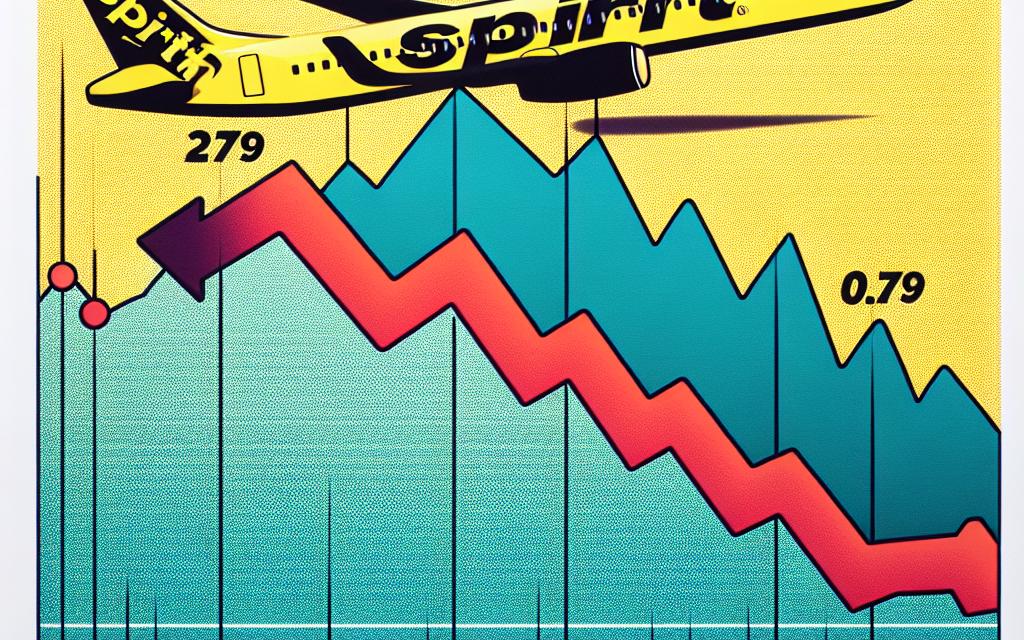“Fitch Grounds Spirit: Navigating Turbulence in Credit Ratings”
Introduction
In a recent development, Fitch Ratings has downgraded Spirit Airlines’ long-term credit rating, reflecting concerns over the airline’s financial stability and operational challenges. The downgrade comes amid a turbulent period for the aviation industry, marked by fluctuating demand, rising fuel costs, and ongoing economic uncertainties. Fitch’s decision highlights the pressures Spirit Airlines faces in maintaining its competitive edge and financial health in a highly volatile market. The revised credit rating underscores the need for strategic adjustments and financial prudence as the airline navigates these complex challenges.
Impact Of Fitch’s Downgrade On Spirit Airlines’ Financial Stability
Fitch Ratings’ recent decision to lower Spirit Airlines’ long-term credit rating has sparked considerable discussion regarding the airline’s financial stability and future prospects. This downgrade, which reflects Fitch’s assessment of Spirit’s creditworthiness, is a significant development that could have far-reaching implications for the airline’s operations and strategic planning. As investors and stakeholders digest this news, it is crucial to understand the potential impact on Spirit Airlines’ financial health and its ability to navigate the competitive landscape of the aviation industry.
To begin with, a credit rating downgrade typically signals increased risk to investors and lenders, as it suggests that the company may face challenges in meeting its financial obligations. For Spirit Airlines, this could translate into higher borrowing costs, as lenders may demand higher interest rates to compensate for the perceived risk. Consequently, the airline might experience increased financial pressure, particularly if it seeks to raise capital for expansion or to manage operational expenses. This scenario could lead to a tightening of financial resources, potentially affecting Spirit’s ability to invest in new aircraft, technology, or customer service improvements.
Moreover, the downgrade could influence Spirit Airlines’ relationships with suppliers and partners. In the aviation industry, maintaining strong partnerships is essential for securing favorable terms and ensuring smooth operations. A lower credit rating might prompt suppliers to reassess their terms of engagement with Spirit, possibly leading to stricter payment conditions or reduced flexibility in negotiations. This shift could impact the airline’s cost structure and operational efficiency, further challenging its competitive position in the market.
In addition to these immediate financial implications, the downgrade may also affect Spirit Airlines’ strategic initiatives. As the airline industry continues to evolve, companies must adapt to changing consumer preferences, regulatory requirements, and technological advancements. Spirit’s ability to pursue strategic initiatives, such as expanding its route network or enhancing its digital capabilities, could be constrained by the financial limitations imposed by the downgrade. This situation might hinder the airline’s growth prospects and its ability to capitalize on emerging opportunities in the market.
Furthermore, the downgrade could have repercussions for Spirit Airlines’ brand perception and customer loyalty. In an industry where consumer trust and brand reputation are paramount, any indication of financial instability can raise concerns among passengers. Customers may question the airline’s ability to maintain service quality or honor commitments, potentially leading to a decline in bookings and revenue. To mitigate this risk, Spirit Airlines will need to communicate effectively with its customers and stakeholders, reassuring them of its commitment to operational excellence and financial resilience.
Despite these challenges, it is important to note that a credit rating downgrade does not necessarily spell doom for Spirit Airlines. The company can take proactive measures to address the concerns raised by Fitch and work towards improving its financial standing. By implementing cost-control strategies, optimizing operational efficiency, and exploring new revenue streams, Spirit can strengthen its financial position and regain investor confidence. Additionally, maintaining transparent communication with stakeholders and demonstrating a commitment to long-term sustainability will be crucial in navigating this period of uncertainty.
In conclusion, Fitch’s downgrade of Spirit Airlines’ long-term credit rating presents a complex set of challenges and opportunities for the airline. While the immediate financial implications are significant, the company’s response to this development will ultimately determine its ability to maintain financial stability and achieve its strategic objectives. By addressing the underlying issues and leveraging its strengths, Spirit Airlines can work towards restoring its creditworthiness and securing a prosperous future in the competitive aviation industry.
Analyzing The Reasons Behind Spirit Airlines’ Credit Rating Downgrade
Fitch Ratings recently announced a downgrade of Spirit Airlines’ long-term credit rating, a move that has sparked considerable discussion within the financial and aviation sectors. This decision reflects a confluence of factors that have raised concerns about the airline’s financial health and operational stability. To understand the rationale behind this downgrade, it is essential to examine the various elements that have influenced Fitch’s assessment.
Firstly, the competitive landscape of the airline industry has been a significant factor. Spirit Airlines operates in the ultra-low-cost carrier segment, a market characterized by intense competition and thin profit margins. The airline faces stiff competition from both traditional carriers and other low-cost airlines, which has put pressure on its pricing strategies and profitability. In recent years, the entry of new competitors and the expansion of existing ones have further intensified this competition, making it challenging for Spirit to maintain its market share without compromising on fares.
Moreover, the economic environment has played a crucial role in Fitch’s decision. The airline industry is highly sensitive to economic fluctuations, and any downturn can have a pronounced impact on passenger demand. With the global economy experiencing uncertainties, including inflationary pressures and geopolitical tensions, consumer spending on discretionary travel has shown signs of weakening. This has led to concerns about Spirit Airlines’ ability to sustain its revenue growth in the face of potential economic headwinds.
In addition to these external factors, internal challenges have also contributed to the downgrade. Spirit Airlines has been grappling with operational disruptions, including flight cancellations and delays, which have affected its reputation and customer satisfaction. These issues have not only led to increased operational costs but have also necessitated investments in improving infrastructure and customer service. While these investments are crucial for long-term growth, they have exerted additional pressure on the airline’s financial resources in the short term.
Furthermore, the airline’s financial metrics have been under scrutiny. Fitch’s downgrade reflects concerns about Spirit’s leverage and liquidity position. The airline has been carrying a significant debt load, which, coupled with rising interest rates, has raised questions about its ability to manage its financial obligations effectively. Although Spirit has taken steps to strengthen its balance sheet, such as cost-cutting measures and strategic partnerships, these efforts have not been sufficient to alleviate concerns about its financial resilience.
Another aspect that has influenced Fitch’s decision is the regulatory environment. The airline industry is subject to stringent regulations, and any changes in regulatory policies can have far-reaching implications for carriers. Spirit Airlines, like its peers, must navigate a complex web of regulations related to safety, environmental standards, and consumer protection. Compliance with these regulations often requires substantial investments, which can strain financial resources and impact profitability.
In conclusion, the downgrade of Spirit Airlines’ long-term credit rating by Fitch is a reflection of multiple interrelated factors. The competitive pressures within the ultra-low-cost carrier segment, coupled with economic uncertainties and internal operational challenges, have raised concerns about the airline’s financial health. Additionally, the scrutiny of its financial metrics and the complexities of the regulatory environment have further contributed to Fitch’s assessment. As Spirit Airlines navigates these challenges, it will need to implement strategic measures to enhance its operational efficiency and financial stability to regain investor confidence and improve its credit standing.
How Spirit Airlines’ Credit Rating Affects Its Future Growth Plans
Spirit Airlines recently faced a significant financial development as Fitch Ratings downgraded its long-term credit rating. This decision has sparked discussions about the potential implications for the airline’s future growth plans. Understanding the impact of this downgrade requires a closer examination of the factors leading to the decision and how it might influence Spirit Airlines’ strategic objectives moving forward.
Fitch’s decision to lower Spirit Airlines’ credit rating was primarily driven by concerns over the airline’s financial health and operational challenges. The rating agency cited increased debt levels and ongoing pressures in the competitive airline industry as key reasons for the downgrade. These factors, coupled with the broader economic uncertainties affecting the travel sector, have raised questions about Spirit’s ability to maintain its growth trajectory.
The downgrade could have several immediate and long-term effects on Spirit Airlines. In the short term, a lower credit rating may increase the airline’s borrowing costs. Lenders typically view a downgraded credit rating as a signal of higher risk, which can lead to higher interest rates on new debt. This, in turn, could strain Spirit’s financial resources, making it more expensive to finance new aircraft purchases, expand routes, or invest in customer service improvements.
Moreover, the downgrade might affect investor confidence. Credit ratings are often used by investors to assess the risk associated with a company’s bonds or other debt instruments. A lower rating could lead to reduced demand for Spirit’s bonds, potentially limiting the airline’s ability to raise capital through debt markets. This could pose a challenge for Spirit as it seeks to fund its growth initiatives, such as expanding its fleet or entering new markets.
Despite these challenges, Spirit Airlines may still find opportunities to pursue its growth plans. The airline has built a reputation for offering low-cost travel options, which could remain attractive to budget-conscious travelers, especially in an uncertain economic environment. By leveraging its cost-efficient business model, Spirit might continue to capture market share from competitors, even as it navigates the financial constraints imposed by the credit rating downgrade.
Furthermore, Spirit Airlines could explore strategic partnerships or alliances to bolster its growth prospects. Collaborations with other carriers or travel-related companies might provide access to new markets or customer segments, helping to offset some of the financial pressures resulting from the downgrade. Additionally, Spirit could focus on enhancing operational efficiencies to improve profitability and strengthen its financial position over time.
In conclusion, while Fitch’s decision to lower Spirit Airlines’ long-term credit rating presents challenges, it does not necessarily spell the end of the airline’s growth ambitions. By carefully managing its financial resources and exploring strategic opportunities, Spirit can continue to pursue its expansion goals. However, the airline will need to remain vigilant in addressing the financial and operational risks highlighted by the downgrade. As Spirit navigates this complex landscape, its ability to adapt and innovate will be crucial in determining its future success.
Investor Reactions To Spirit Airlines’ Lowered Credit Rating

Fitch Ratings recently downgraded Spirit Airlines’ long-term credit rating, a move that has sparked varied reactions among investors. This decision by Fitch reflects concerns over the airline’s financial health and its ability to navigate the challenging economic landscape. As investors digest this news, it is crucial to understand the implications of such a downgrade and how it might influence investment strategies moving forward.
To begin with, a credit rating downgrade typically signals increased risk associated with a company’s debt. For Spirit Airlines, this means that borrowing costs could rise, as lenders may demand higher interest rates to compensate for the perceived risk. Consequently, the airline might face challenges in securing favorable financing terms, which could impact its ability to invest in growth initiatives or manage operational costs effectively. Investors, therefore, are likely to reassess their positions, weighing the potential risks against the airline’s long-term prospects.
Moreover, the downgrade comes at a time when the airline industry is grappling with multiple headwinds, including fluctuating fuel prices, labor shortages, and evolving consumer preferences. These factors have collectively strained the financial performance of many carriers, including Spirit Airlines. As a result, investors are increasingly cautious, seeking to understand how Spirit plans to address these challenges while maintaining its competitive edge in the low-cost carrier segment.
In response to the downgrade, some investors may choose to divest from Spirit Airlines, reallocating their capital to more stable opportunities. This reaction is often driven by a desire to minimize exposure to potential losses, especially in a volatile market environment. On the other hand, some investors might view the downgrade as an opportunity to buy into Spirit Airlines at a lower price point, banking on the airline’s ability to rebound and deliver long-term value. This contrarian approach hinges on the belief that the market may have overreacted to the downgrade, presenting a chance to acquire undervalued assets.
Furthermore, it is essential to consider the broader context in which this downgrade occurs. The airline industry is undergoing significant transformation, with sustainability and technological advancements at the forefront of strategic priorities. Spirit Airlines, known for its cost-efficient operations, may need to adapt its business model to align with these emerging trends. Investors will be keenly observing how the airline positions itself in this evolving landscape, particularly in terms of fleet modernization and customer experience enhancements.
Additionally, the role of management in navigating these turbulent times cannot be overstated. Investors will scrutinize the leadership’s ability to implement effective cost-control measures, optimize operational efficiency, and capitalize on growth opportunities. Transparent communication from Spirit Airlines regarding its strategic plans and financial outlook will be crucial in restoring investor confidence and mitigating the impact of the credit rating downgrade.
In conclusion, Fitch’s decision to lower Spirit Airlines’ long-term credit rating has elicited a range of reactions from investors, reflecting the complexities of the current economic environment. While some may choose to reduce their exposure, others might see potential for future gains. Ultimately, the airline’s ability to address industry challenges, adapt to changing market dynamics, and execute its strategic vision will be pivotal in shaping investor sentiment and determining its financial trajectory. As the situation unfolds, investors will continue to monitor developments closely, adjusting their strategies accordingly to navigate the uncertainties ahead.
Comparing Spirit Airlines’ Credit Rating With Other Low-Cost Carriers
Fitch Ratings recently downgraded Spirit Airlines’ long-term credit rating, a move that has sparked discussions about the financial health of low-cost carriers in the aviation industry. This decision places Spirit Airlines under scrutiny, especially when compared to its peers in the low-cost carrier segment. To understand the implications of this downgrade, it is essential to examine how Spirit Airlines’ credit rating compares with other budget airlines and what this means for the industry as a whole.
Spirit Airlines, known for its ultra-low-cost business model, has been a significant player in the budget airline market. However, the recent downgrade by Fitch reflects concerns about the airline’s financial stability and its ability to manage debt effectively. This change in credit rating can affect Spirit’s borrowing costs and its ability to raise capital, which are crucial for maintaining operations and funding future growth. In contrast, other low-cost carriers, such as Southwest Airlines and JetBlue, have managed to maintain relatively stable credit ratings, which suggests a more robust financial footing.
Southwest Airlines, often considered the pioneer of the low-cost carrier model, has consistently demonstrated strong financial performance. Its credit rating remains stable, supported by a solid balance sheet and a reputation for operational efficiency. Southwest’s ability to maintain a healthy cash flow and manage its debt obligations effectively has allowed it to weather economic downturns better than some of its competitors. This stability is reflected in its credit rating, which remains higher than that of Spirit Airlines.
Similarly, JetBlue has managed to uphold a favorable credit rating, thanks to its strategic initiatives and prudent financial management. The airline has focused on expanding its network and enhancing customer experience while keeping costs in check. JetBlue’s approach to balancing growth with financial discipline has contributed to its relatively strong credit rating, setting it apart from Spirit Airlines in the low-cost carrier segment.
In addition to Southwest and JetBlue, other budget airlines like Frontier Airlines and Allegiant Air also present interesting comparisons. Frontier Airlines, for instance, has been working on improving its financial metrics and operational efficiency. While its credit rating is not as high as Southwest’s, it has not faced the same level of downgrade as Spirit Airlines. Allegiant Air, on the other hand, has carved out a niche by focusing on underserved markets and maintaining a lean operational model, which has helped it sustain a stable credit rating.
The downgrade of Spirit Airlines’ credit rating by Fitch highlights the challenges faced by low-cost carriers in a competitive and volatile market. Rising fuel costs, fluctuating demand, and economic uncertainties pose significant risks to airlines operating on thin margins. For Spirit Airlines, the downgrade serves as a wake-up call to reassess its financial strategies and explore ways to strengthen its balance sheet.
In conclusion, while Spirit Airlines grapples with the implications of its lowered credit rating, other low-cost carriers like Southwest, JetBlue, Frontier, and Allegiant continue to demonstrate varying degrees of financial resilience. The comparison underscores the importance of sound financial management and strategic planning in navigating the complexities of the aviation industry. As Spirit Airlines works to address its financial challenges, the broader low-cost carrier segment remains a dynamic and evolving landscape, with each airline striving to balance growth with financial stability.
Strategies For Spirit Airlines To Improve Its Credit Rating
Spirit Airlines recently faced a setback as Fitch Ratings downgraded its long-term credit rating, a move that underscores the challenges the airline must address to improve its financial standing. This development calls for a strategic reassessment of Spirit Airlines’ operations and financial management to regain investor confidence and enhance its creditworthiness. To navigate this complex landscape, Spirit Airlines can adopt several strategies aimed at improving its credit rating over the long term.
Firstly, enhancing operational efficiency is crucial. By optimizing flight schedules, reducing turnaround times, and improving fuel efficiency, Spirit Airlines can significantly cut costs. Implementing advanced data analytics can help in predicting demand more accurately, allowing the airline to adjust capacity and pricing strategies accordingly. This not only maximizes revenue but also ensures that resources are allocated efficiently, thereby improving the bottom line. Furthermore, investing in newer, more fuel-efficient aircraft can reduce maintenance costs and fuel expenses, contributing to better financial performance.
In addition to operational improvements, Spirit Airlines should focus on diversifying its revenue streams. While the airline has traditionally relied on ancillary fees for a significant portion of its income, exploring new revenue opportunities could provide a buffer against market volatility. For instance, expanding partnerships with other airlines through code-sharing agreements can open up new markets and customer bases. Additionally, enhancing loyalty programs to increase customer retention and exploring cargo services could provide additional revenue channels.
Moreover, strengthening the balance sheet is essential for improving credit ratings. Spirit Airlines should prioritize debt reduction by using excess cash flow to pay down existing obligations. This not only reduces interest expenses but also improves the company’s leverage ratios, making it more attractive to investors and credit rating agencies. Additionally, maintaining a healthy cash reserve is vital to weather economic downturns and unexpected disruptions, such as those experienced during the COVID-19 pandemic. By demonstrating financial resilience, Spirit Airlines can instill greater confidence in its long-term viability.
Another critical area for Spirit Airlines to address is customer satisfaction. Enhancing the overall customer experience can lead to increased brand loyalty and repeat business, which are vital for sustained revenue growth. Investing in staff training, improving in-flight services, and ensuring timely communication with passengers can significantly boost customer perceptions. Moreover, leveraging technology to streamline the booking process and provide real-time updates can enhance convenience for travelers, thereby improving their overall experience with the airline.
Furthermore, Spirit Airlines should engage in transparent and proactive communication with stakeholders, including investors, employees, and customers. By clearly articulating its strategic vision and financial goals, the airline can build trust and demonstrate its commitment to long-term growth. Regular updates on progress and challenges can help manage expectations and foster a sense of partnership with stakeholders.
In conclusion, while the downgrade by Fitch Ratings presents a challenge for Spirit Airlines, it also offers an opportunity to implement strategic changes that can enhance its credit rating over time. By focusing on operational efficiency, diversifying revenue streams, strengthening the balance sheet, improving customer satisfaction, and maintaining transparent communication, Spirit Airlines can position itself for a more stable and prosperous future. These efforts, if executed effectively, can not only restore investor confidence but also ensure the airline’s competitiveness in an ever-evolving industry.
The Role Of Economic Conditions In Spirit Airlines’ Credit Rating Downgrade
Spirit Airlines, a prominent player in the low-cost carrier segment, recently faced a significant financial development as Fitch Ratings downgraded its long-term credit rating. This decision, while influenced by various factors, underscores the intricate relationship between economic conditions and the financial health of airlines. Understanding this connection requires a closer examination of the broader economic landscape and its impact on the aviation industry, particularly for budget airlines like Spirit.
To begin with, the airline industry is inherently sensitive to economic fluctuations. During periods of economic growth, consumer confidence typically rises, leading to increased discretionary spending, including travel. Conversely, economic downturns often result in reduced consumer spending as individuals prioritize essential expenses over leisure activities. This cyclical nature of the economy directly affects airlines’ revenue streams, as passenger demand is closely tied to economic conditions. For Spirit Airlines, which operates on a low-cost model, maintaining high passenger volumes is crucial for profitability. Therefore, any economic instability can pose significant challenges to its financial performance.
Moreover, the recent downgrade by Fitch can be attributed to several macroeconomic factors that have created a challenging environment for airlines. Rising fuel prices, for instance, have been a persistent concern for the aviation sector. Fuel costs constitute a substantial portion of an airline’s operating expenses, and fluctuations in oil prices can significantly impact profitability. In recent times, geopolitical tensions and supply chain disruptions have contributed to volatile fuel prices, thereby exerting financial pressure on airlines like Spirit.
In addition to fuel costs, inflationary pressures have also played a role in the credit rating downgrade. Inflation affects various aspects of airline operations, from labor costs to maintenance expenses. As inflation rises, airlines may face increased costs that are difficult to pass on to price-sensitive consumers, particularly in the low-cost segment. This situation can erode profit margins and strain financial resources, making it challenging for airlines to maintain a stable financial footing.
Furthermore, the lingering effects of the COVID-19 pandemic continue to cast a shadow over the airline industry. Although there has been a gradual recovery in air travel demand, the pandemic has fundamentally altered consumer behavior and travel patterns. Uncertainty regarding future variants and potential travel restrictions remains a concern, impacting airlines’ ability to plan and invest confidently. For Spirit Airlines, which relies heavily on leisure travel, any resurgence of the pandemic could disrupt its operations and financial stability.
In light of these economic conditions, Fitch’s decision to lower Spirit Airlines’ credit rating reflects a cautious assessment of the airline’s ability to navigate these challenges. The downgrade serves as a reminder of the interconnectedness between economic factors and the financial health of airlines. It highlights the need for airlines to adopt robust risk management strategies and maintain financial flexibility to weather economic uncertainties.
In conclusion, Spirit Airlines’ credit rating downgrade by Fitch underscores the significant role that economic conditions play in shaping the financial landscape of the aviation industry. As airlines continue to grapple with rising fuel costs, inflationary pressures, and the ongoing impact of the pandemic, their ability to adapt and respond to these challenges will be crucial in determining their long-term financial stability. For Spirit Airlines, navigating this complex economic environment will require strategic planning and a keen focus on operational efficiency to ensure sustained growth and resilience in the face of adversity.
Q&A
1. **What is the current long-term credit rating of Spirit Airlines by Fitch?**
Fitch has downgraded Spirit Airlines’ long-term credit rating to ‘B+’.
2. **What was the previous long-term credit rating of Spirit Airlines by Fitch?**
The previous long-term credit rating was ‘BB-‘.
3. **What is the outlook for Spirit Airlines’ credit rating according to Fitch?**
The outlook is stable.
4. **What are the reasons for the downgrade of Spirit Airlines’ credit rating?**
The downgrade is due to concerns about increased leverage, operational challenges, and competitive pressures in the airline industry.
5. **How does the downgrade affect Spirit Airlines’ borrowing costs?**
A lower credit rating typically results in higher borrowing costs due to perceived increased risk by lenders.
6. **What impact does the downgrade have on Spirit Airlines’ financial strategy?**
The downgrade may limit Spirit Airlines’ financial flexibility and ability to raise capital at favorable terms.
7. **What measures can Spirit Airlines take to improve its credit rating?**
Spirit Airlines can focus on reducing debt, improving operational efficiency, and enhancing profitability to potentially improve its credit rating in the future.
Conclusion
Fitch Ratings recently downgraded Spirit Airlines’ long-term credit rating, reflecting concerns over the airline’s financial stability and operational challenges. The downgrade indicates increased risk for investors and may lead to higher borrowing costs for Spirit. Factors contributing to this decision include volatile fuel prices, competitive pressures in the low-cost carrier market, and potential disruptions in travel demand. The lowered rating underscores the need for Spirit to strengthen its financial position and operational efficiency to regain investor confidence and improve its creditworthiness in the long term.





